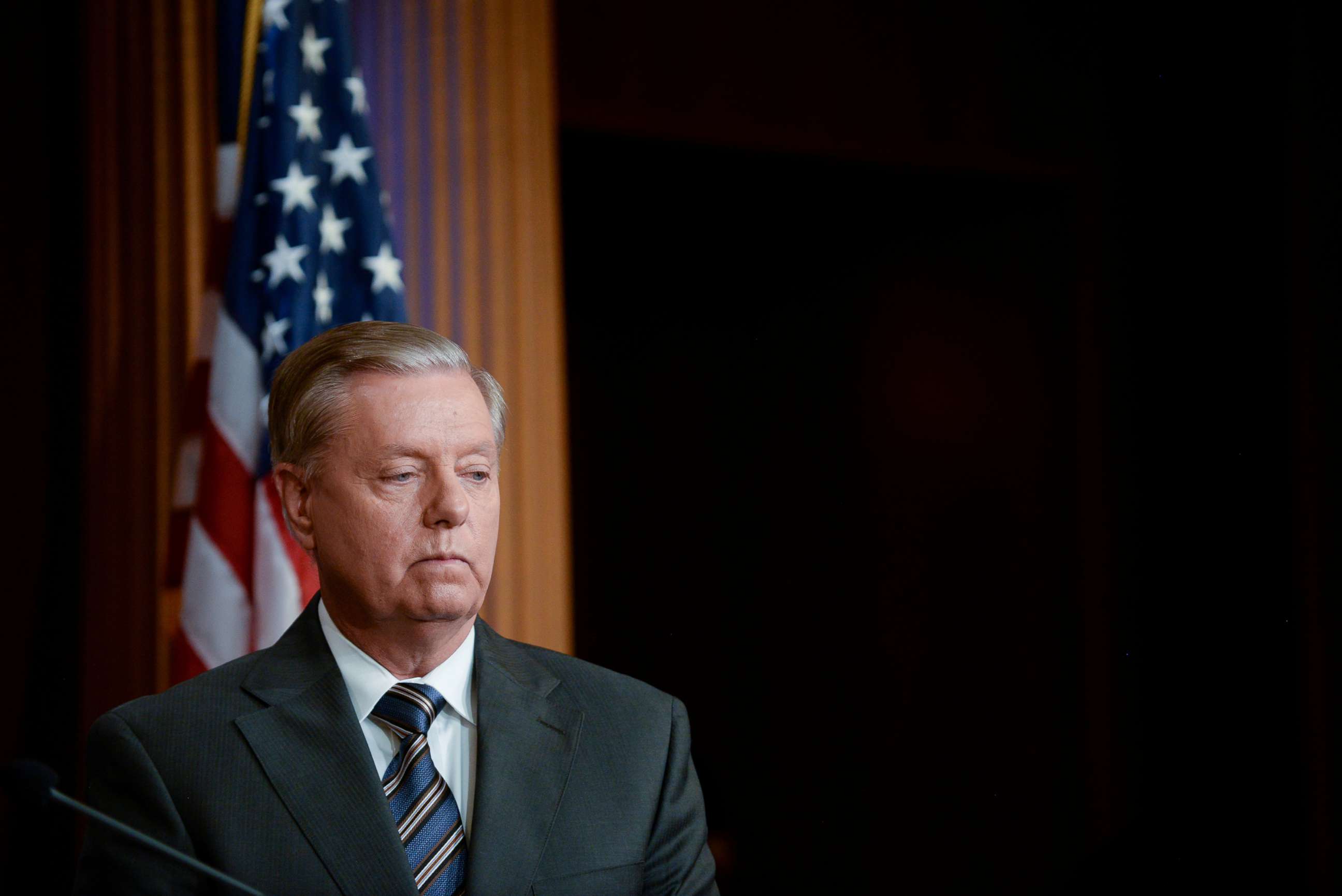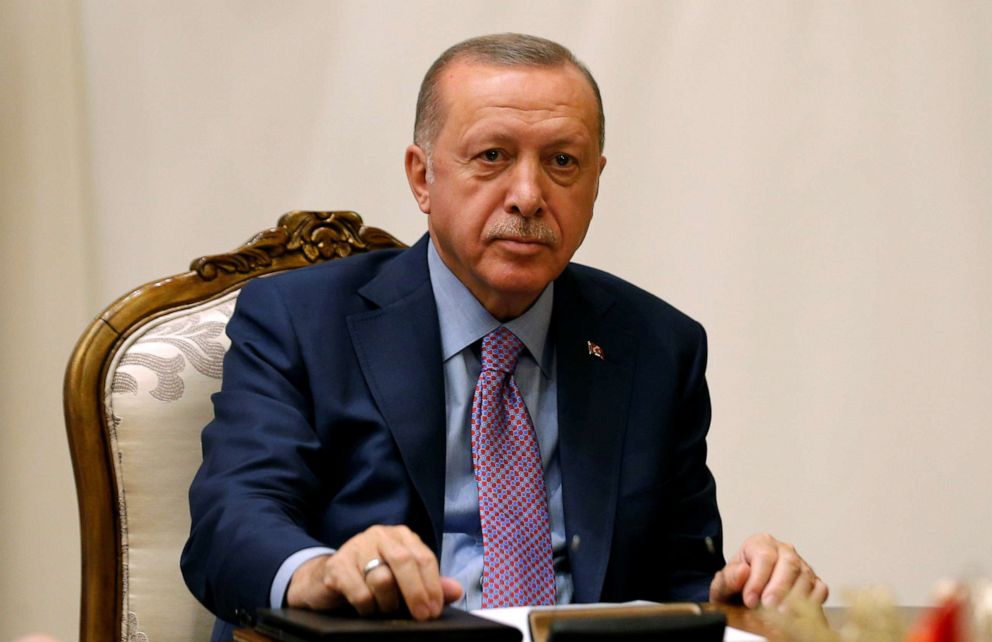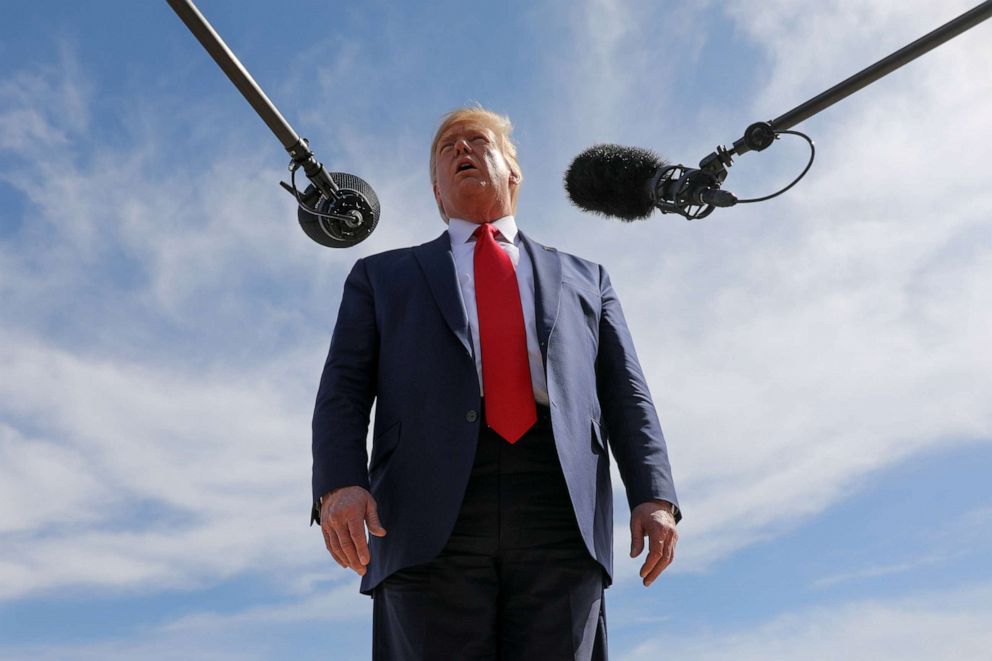Republican lawmakers are cautiously optimistic about Turkish ceasefire
"The fact that the slaughter has stopped is good news," Graham says.
Republican lawmakers are cautiously optimistic on the heels of an announced ceasefire in northern Syria between its forces, their opposition allies and U.S.-backed Syrian Kurds.
Sen. Lindsey Graham, who on Thursday introduced a tough sanctions package leveled against Turkey that would go much further than the sanctions imposed by the White House, told reporters after the ceasefire was announced that he was encouraged by the developments.

"The fact that the slaughter has stopped is good news," the South Carolina Republican said. "But I promise you this: five days from now, I will feel just as committed to making sure Turkey is out of Syria as I am today. I will feel just as committed to making sure we don't abandon the Kurds as I am today. And I'm going to give it a chance -- give a ceasefire a chance. Whether it results in peace, I don't know."
Following negotiations on Thursday, the U.S. and Turkey released a joint statement that said Turkey "will pause" its operations for 120 hours for those Kurdish forces to withdraw from a 20-mile-deep territory that will then be controlled by Turkey. Turkey's operation in northern Syria "will be halted upon completion of this withdrawal," which will be facilitated by the U.S., according to Vice President Mike Pence. He called the agreement a ceasefire, although Turkish Foreign Minister Mevlut Cavusoglu said it was a "pause in Turkey's operation" and "not a ceasefire."

Moments before a ceasefire was announced, Graham said he'd consider dropping his sanctions bill if Turkey withdrew from northern Syria.
Graham's legislation, co-authored with Democratic Sen. Chris Van Hollen of Maryland, would apply new sanctions to senior Turkish officials, including President Recep Tayyip Erdogan, key Turkish banks, military transactions and their energy sector activities in support of the Turkish Armed Forces.
It would also require the U.S. Treasury to move forward with delayed sanctions under CAATSA over Turkey's decision to obtain the S-400 Russian missile defense system. U.S. military assistance to Turkey would also be prohibited, Erdogan and Turkish leadership would be barred from visiting the United States and reports would be required on the net worth and assets of Erdogan amid concerns of corruption. It also it demands a strategy from the administration to defeat them and stabilize the region.
"I told the president this is something maybe that we can build on, please consider our efforts in Congress being an ally, giving you leverage," Graham said, noting that his sanctions legislation is still on the table.
On the news of the ceasefire, other Republicans, like Sen. John Kennedy of Louisiana cautioned, "it's a lot easier to let the cat out of the bag than it is to get the cat back in the bag."
The ceasefire was a dramatic twist on Capitol Hill after Republicans and Democrats alike spent days bashing the president for pulling U.S. troops out of northern Syria.
On Thursday, House Speaker Nancy Pelosi and Senate Minority Leader Chuck Schumer released a statement blasting the president for reversing sanctions against Turkey in exchange for what they call a "sham ceasefire."
"President Erdogan has given up nothing, and President Trump has given him everything," the joint statement said. "The Turks have stated that 'this is not a ceasefire,' and made clear that they 'will pause the operation for 120 hours in order for the terrorists to leave' -- referring to the courageous Kurdish fighters who have suffered nearly 11,000 casualties in our fight to defeat ISIS."
On Wednesday, the House passed a nonbinding resolution slamming the decision in an overwhelming 354-60 vote.
But in the Senate, Leader Mitch McConnell said he would like the chamber to take up a resolution rebuking Trump for pulling U.S. troops from Syria that is tougher than the one that cleared the House.
"My first preference is for something stronger than the House resolution," McConnell said on the Senate floor on Thursday morning.
"As the Senate debates our Middle East policy and contemplates what action to take, I believe it's important we make a strong, forward-looking strategic statement," McConnell said. "For that reason, my preference would be for something even stronger than the resolution the House passed yesterday which has some serious weaknesses."
McConnell said the House resolution is "so narrowly drafted" that it failed to address the plight of imperiled Sunni Arabs and minority Christian communities.
He called the House resolution "backward looking" and said it failed to address whether the U.S. should even sustain a military presence in Syria, "perhaps to spare Democrats from having to go on record on this key question," he said.
He vowed that he would have "much more" to say on the subject very soon.
McConnell's announcement came shortly after a group of senators on the Armed Services Committee received a secret briefing from Secretary of Defense Mark Esper and Gen. Mark Milley, the chairman of the Joint Chiefs of Staff.
"My reaction is horror and shame," Sen. Richard Blumenthal, D-Conn., said Thursday, following the meeting.
"The American people deserve to hear what we heard today," Blumenthal said. "The American people should be present in an open hearing. We need an open hearing. There is no reason that what we heard today, cannot be said for the most part, in public and there's every reason to know about this disaster."
Blumenthal later called the news of the ceasefire a "deceptive bait-and-switch that should redouble determination to pass our strong sanctions bill."

"Do not be fooled -- the announced ceasefire is neither a military victory for our Kurdish partners in Syria, nor a diplomatic victory for the Trump Administration. This illusory solution is a catastrophic, roundabout way for President Trump to give President Erdogan exactly what he wanted: a Kurdish withdrawal, and free reign over northern Syria. The President got rolled, and so did our national integrity. It is yet another betrayal to our Kurdish partners and a boon to our adversaries, Russia and Iran," Blumenthal said in a statement.
Earlier in the week, Republicans were growing increasingly concerned with the administration's foreign policy moves in Syria.
"My goodness, the lack of preparation and thinking about how we could have transitioned to a setting where we can protect the Kurds and also hopefully meet Turkey's needs and interests — that's something we should have considered a long time ago before we pulled our troops out," Sen. Mitt Romney, R-Utah, said.
"But now, to go over and say let's talk to Erdogan is like, 'Hey guys, you let the horses out of the barn. This is, this is too late to be talking about locking the barn door," he added.
Sen. Marco Rubio, R-Fla., echoed Romney's exasperation.
"Frankly, I don't know at this point what we can do to reverse some of the damage this is doing to our long-term national interests," Rubio said.
Rubio said he fears Erdogan is planning an ethnic cleansing of the Kurds.
"This is a really problematic situation that's unfolding," he said. "Frankly, I don't know at this point what we can do to reverse some of the damage this is doing to our long-term national interests."
On Friday, Romney took to the Senate floor with a scathing speech, saying, "American honor has already been tarnished," despite the news of a breakthrough ceasefire.
"We once abandoned a red line. Now we abandon an ally. Mr. President, we need answers. What has happened in Syria should not happen again," Romney said.




